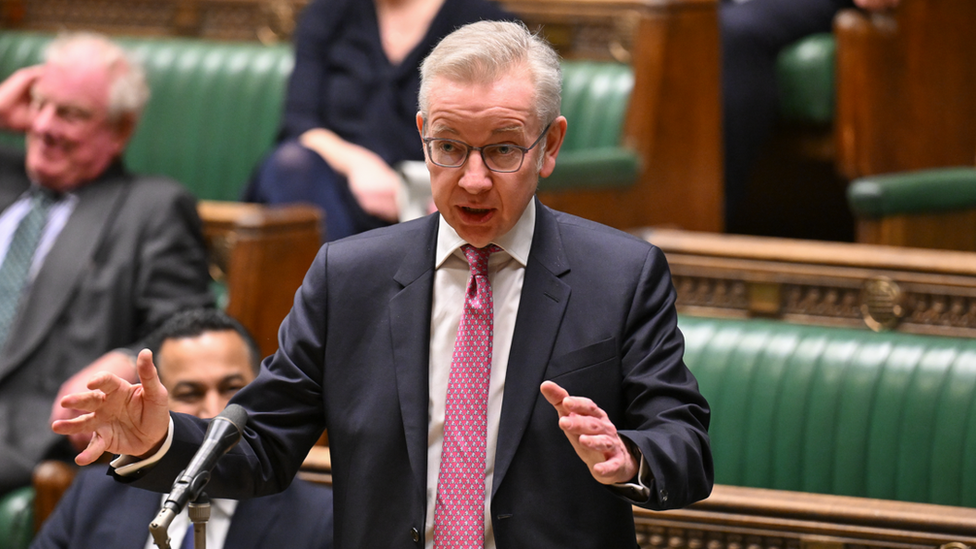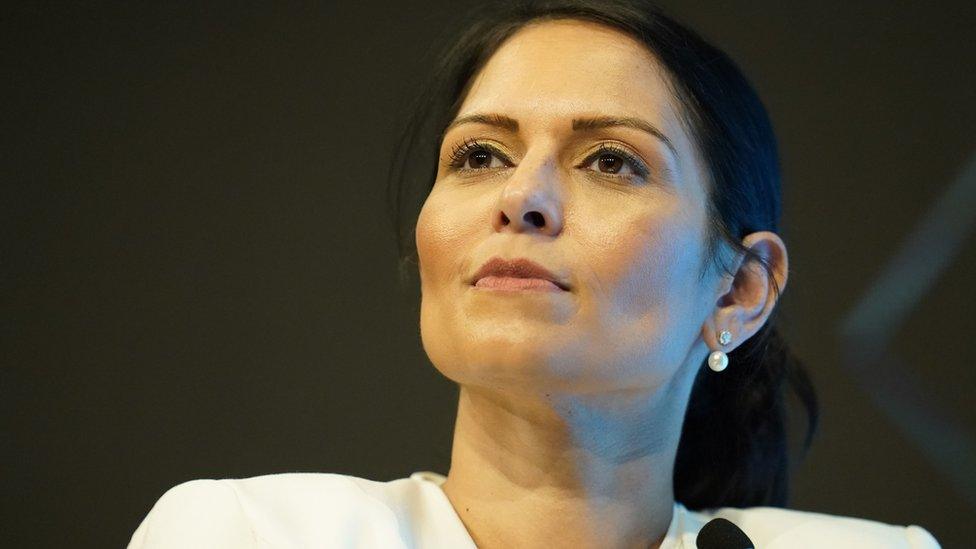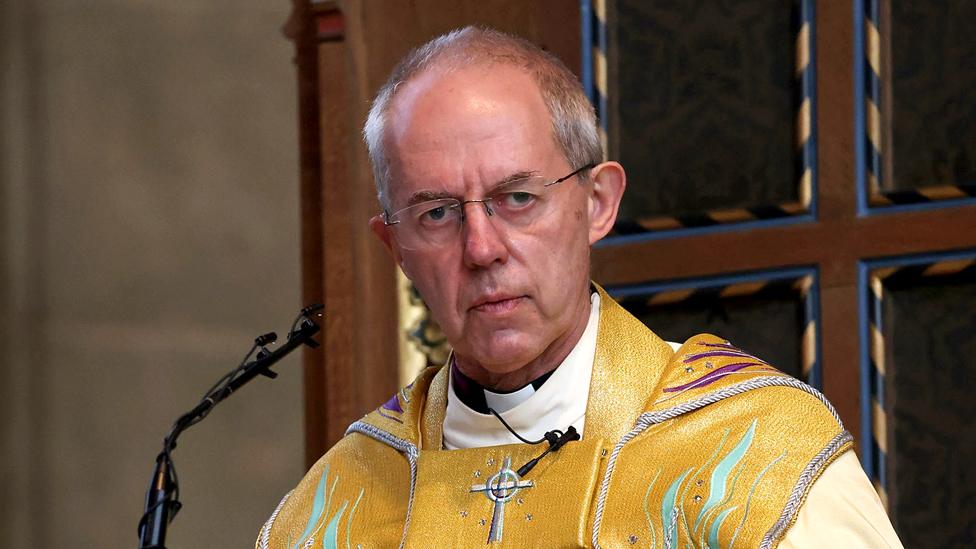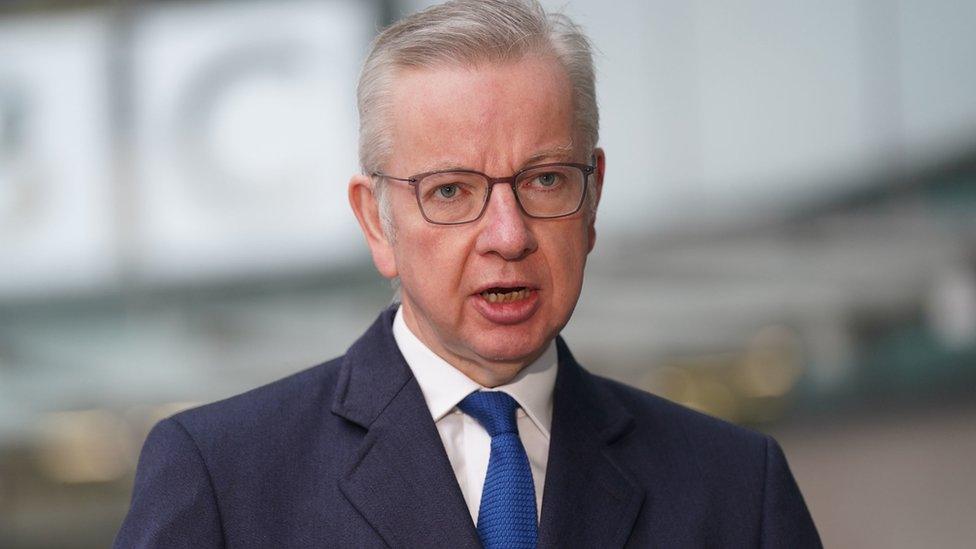Michael Gove names groups as he unveils extremism definition
- Published

Michael Gove has named five groups he said would be assessed against a new government definition of extremism.
The communities secretary told MPs he had concerns about the "Islamist orientation" of three of the organisations.
He also named two groups he said promoted a "Neo-Nazi ideology".
The new extremism definition applies to, but does not criminalise, groups promoting an ideology based on "violence, hatred or intolerance".
Groups judged to meet the new definition - expected to be named in the coming weeks - will be blocked from receiving government funding and meeting officials.
The definition has been met with a backlash from civil liberty and community groups, with two of the groups mentioned by Mr Gove already threatening legal action if they end up on the list.
The unveiling of the new definition comes amid the backdrop of heightened community tensions over the Israel-Hamas war, and political rows over the policing of pro-Palestinian marches in London.
The community secretary has said a list of organisations meeting the new definition will be drawn up following "careful" reviews of evidence and consultation with civil servants.
But speaking in the Commons, he said the British National Socialist Movement and Patriotic Alternative would see their activities assessed against the new definition.
He said the groups "promote Neo-Nazi ideology" and were "precisely the type of groups about which we should be concerned".
He also named the Muslim Association of Britain, Cage and Muslim Engagement and Development (MEND) as organisations that "give rise to concern for their Islamist orientation and views".
"We will be holding these, and other organisations, to account to assess if they meet our definition of extremism and will take action as appropriate," he added.
He defined Islamism as a "totalitarian ideology" that calls for "an Islamic state governed by sharia law," and should not be conflated with Islam itself.
'Stifle dissenting voices'
The new definition will define extremism as "the promotion or advancement of an ideology based on violence, hatred or intolerance, that aims to:
1. negate or destroy the fundamental rights and freedoms of others; or
2. undermine, overturn or replace the UK's system of liberal parliamentary democracy and democratic rights; or
3. intentionally create a permissive environment for others to achieve the results in (1) or (2)."
The chief executive of MEND, Azhar Qayum, said his group was "not at all" extremist and would take the government to court if it ends up listed as such.
Speaking to the BBC, he accused Mr Gove of taking "names out of a hat" under the legal protection afforded to MPs speaking in Parliament.
Cage said it would "explore all avenues, including legal" to challenge the "government's deep dive into authoritarianism," whilst the Muslim Association of Britain described Mr Gove's move as "blatant effort to stifle dissenting voices".
Patriotic Alternative said Mr Gove had made "several misleading claims" about it, and his extremism definition was a "dangerous step toward a totalitarian state".
In the Commons, former Home Office minister Robert Jenrick said Mr Gove's definition "though well-intentioned, lands in no man's land".
He said he feared it would not do enough to "tackle the real extremists," or do enough to protect people who are "simply expressing contrarian views".
Fellow Conservative MP Mariam Cates said it could see "gender critical feminists" labelled as extremists, and end up "chilling speech of people who have perfectly legitimate, harmless views".
'Insufficiently policed'
Deputy Labour leader Angela Rayner said her party would "challenge and probe" the government's new definition, but pressed Mr Gove for more detail on how it will "work in practice".
She also questioned the timing of the announcement, noting the Conservatives have been in government for 13 years.
In response, Mr Gove said the previous extremism definition, in place since 2011, was "insufficiently precise" and had been "insufficiently policed".
Groups and individuals labelled extremist will have the right to seek reassessment and submit new evidence to a review.
If they still disagree, they can challenge the government's decision through a judicial review of the decision.
Organisations or individuals added to the list will not be criminalised, unlike terrorist groups.
Alongside the redefinition, a new unit - the Counter-Extremism Centre of Excellence - has been set up, to gather intelligence and identify extremist groups.

The groups named by Gove
Patriotic Alternative
Anti-extremism campaign group Hope Not Hate describes Patriotic Alternative as the UK's largest fascist group. Some of its followers were involved in the group National Action, which was subsequently banned under terrorism laws. Patriotic Alternative says its is promoting a patriotic view of the UK - but its critics say followers regularly espouse Nazi thinking.
British National Socialist Movement
British National Socialist Movement has been described in Parliament as a white supremacist group that originated in 1968.
Muslim Association of Britain
The MAB was described by Michael Gove as the UK affiliate of the Muslim Brotherhood, an international and complex network of Islamist organisations. Islamism is a political ideology that believes that predominantly Muslim countries should be run according to a form of government drawn from Islam's holy book, the Quran. Islamism has many branches. Some Islamist groups are so extreme they are also terrorist - but that is not true for every such organisation. The MAB denies it is an affiliate group and says it has long worked within the law and alongside agencies including the police. In 2015, then PM David Cameron commissioned a report, external into the Muslim Brotherhood including any activities in the UK.
Cage
Cage emerged as a campaign group against the "War on Terror" that was launched by President George W Bush in the wake of the 2001 attacks on the US. It explicitly campaigned against what it said were abuses perpetrated against Muslims in Afghanistan and elsewhere - but its critics say it was often acting for terrorism suspects. It has never been accused of involvement in terrorism and one of its founders has repeatedly won legal cases where he has been accused of involvement in suspect groups.
MEND
Mend, Muslim Engagement and Development, is a Muslim campaign group that tries to encourage people to get more involved in politics and is active in opposing policies that critics say perpetuate a them-and-us victim mentality. The organisation says it legitimately campaigns to protect the rights of British Muslims and has said it will take the government to court if it is named as extremist.
UPDATE 15 March: This piece has been updated to reflect that Michael Gove described the Muslim Association of Britain as an affiliate of the Muslim Brotherhood and that they deny any such link.
Related topics
- Published11 March 2024

- Published13 March 2024

- Published14 March 2024
